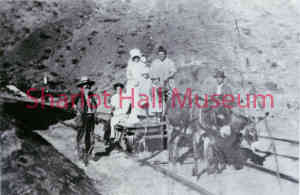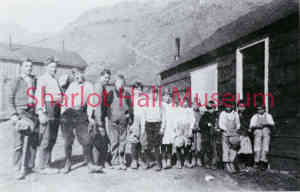By Marjory J. Sente
 The Ocotillo Post Office was established in 1916, and Pearl C. Orr was named its first and only postmistress, serving until it closed nine years later. In its first life, the post office was called Middleton or Middelton and served the mining town of Middleton located in the Bradshaw Mountains from 1903 to 1908. During World War I, the Consolidated Arizona Mining Company reopened the De Soto in 1915 and Middleton quickly boasted a population of 100. The post office was reestablished under the name Ocotillo because Post Office Department regulations prohibited reusing the name of a discontinued post office.
The Ocotillo Post Office was established in 1916, and Pearl C. Orr was named its first and only postmistress, serving until it closed nine years later. In its first life, the post office was called Middleton or Middelton and served the mining town of Middleton located in the Bradshaw Mountains from 1903 to 1908. During World War I, the Consolidated Arizona Mining Company reopened the De Soto in 1915 and Middleton quickly boasted a population of 100. The post office was reestablished under the name Ocotillo because Post Office Department regulations prohibited reusing the name of a discontinued post office.
Pearl Childers was born in the Indian Territory in 1879 to Thomas N. and Melvina Childers. At the age of six, she moved with her family to Fleming, New Mexico Territory. In 1897 she married William R. Orr, a Nebraska native. Three years later, they were living in Silver City, New Mexico Territory, and already had Thelma, their first daughter. Three sons (Robert, Ernest and Floyd) and many moves later, they landed at McCabe, Arizona Territory, in 1906. They had traveled from New Mexico to Washington state (Pearl couldn’t stand the climate according to her grandson, Jack Orr Jr.) then to Arizona. Pearl’s parents moved to McCabe, too. Mrs. Childers died in 1907, but Thomas, whose primary occupation was a miner, lived until 1931. From 1909 through about 1912 he was Yavapai County’s Road Supervisor.
 The Orr family moved to Middleton in 1914. William became the tram foreman for the De Soto Mine after working on it for two years at the Blue Bell Siding where he reportedly made $3.50 a day. Both the De Soto and Blue Bell mines used tramways to transport ore from the mines to sidings on the Bradshaw Mountain Railroad. The ore then went by rail to the smelter in Humboldt for processing.
The Orr family moved to Middleton in 1914. William became the tram foreman for the De Soto Mine after working on it for two years at the Blue Bell Siding where he reportedly made $3.50 a day. Both the De Soto and Blue Bell mines used tramways to transport ore from the mines to sidings on the Bradshaw Mountain Railroad. The ore then went by rail to the smelter in Humboldt for processing.
Pearl was a housewife who could read and write. Perhaps these capabilities, and William’s position with the mining company, facilitated her appointment as postmistress of the Ocotillo post office. While a key position in the community, it likely didn’t put much money in the family’s coffers. In 1905 compensation for the town’s postmaster was $136.16. Roughly ten years later (with Middleton’s small population), it would have been similar.
Her son Floyd was ten years old when they moved to Middleton. He and his four siblings attended the Middleton school. In an oral history, Floyd said he went to school in Mayer to the third grade and completed the seventh grade in Middleton. He also discussed carrying the mail five times a week between Cleator and Middleton, a six mile round trip, for $4.00 a month. At best he made twenty cents a day or a fraction more than three cents a mile for his efforts. Floyd said the job lasted for three months.
In the 1920 election, Pearl represented Ocotillo on the Republican Party’s County Advisory Committee. By 1925 the De Soto ceased operation, Middleton’s population shrank to fewer than a dozen, and the post office closed with mail service going to Cleator.
Although Pearl was listed as the Ocotillo postmistress until it closed, the 1924, 1926 and 1928 voter registration records have Pearl and William living in Prescott. He was a butcher for Bishop’s Market. By 1930 they were living in Humboldt. They moved to the Pioneers Home in Prescott in 1941. William died on October 14, 1943; Pearl passed a year later to the day. They are both buried in the Independent Order of Odd Fellows (IOOF) Cemetery in Prescott.
“Days Past” is a collaborative project of the Sharlot Hall Museum and the Prescott Corral of Westerners International (www.prescottcorral.org). This and other Days Past articles are also available at www.archives.sharlothallmuseum.org/articles/days-past-articles/1 The public is encouraged to submit proposed articles and inquiries to dayspast@sharlothallmuseum.org Please contact SHM Research Center reference desk at 928-277-2003, or via email at archivesrequest@sharlothallmuseum.org for information or assistance with photo requests.


